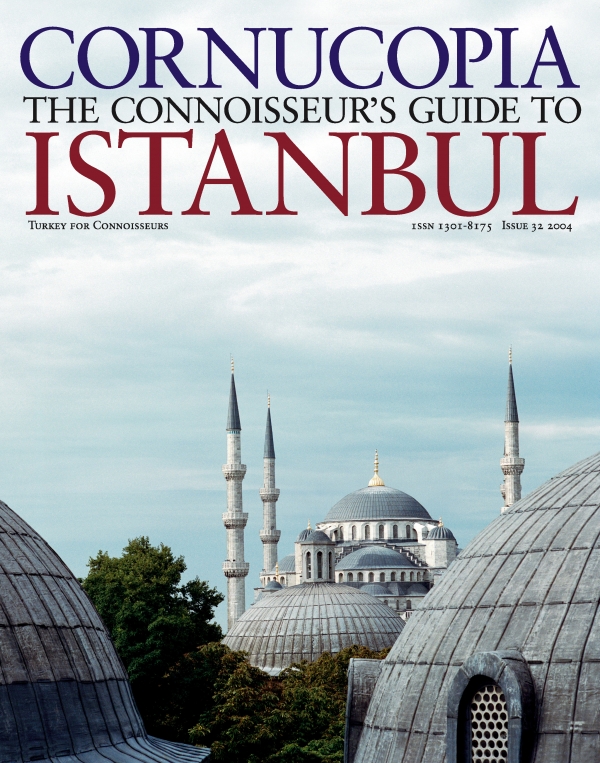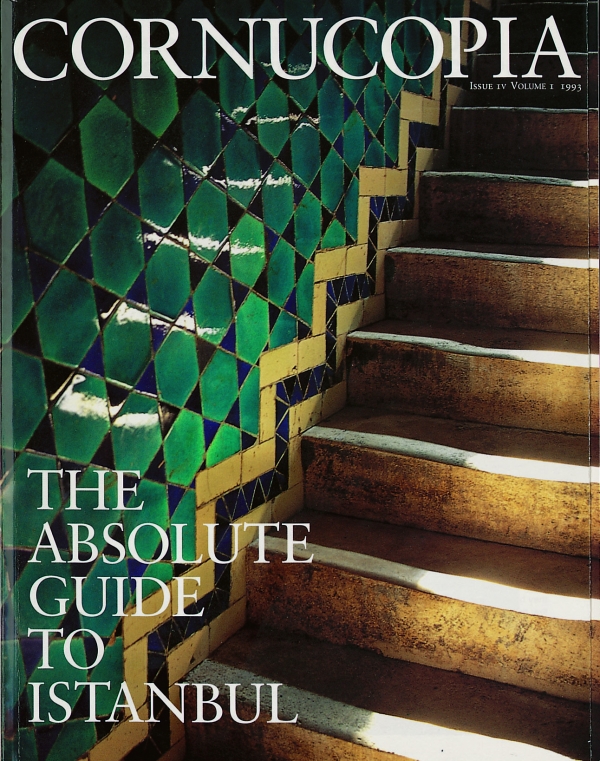Buy or gift a stand-alone digital subscription and get unlimited access to dozens of back issues for just £18.99 / $18.99 a year.
Please register at www.exacteditions.com/digital/cornucopia with your subscriber account number or contact subscriptions@cornucopia.net
Buy a digital subscription Go to the Digital EditionGive yourself over to the grit and bustle of Eminönü’s waterside markets, then ascend to Sinan’s sublime hilltop mosques – the awesome Süleymaniye and the haunting Şehzade. In their shadow is the exuberantly tiles Rüstem Pasha Mosque. Cornucopia devotes 24 pages to this vibrant area, with features on Eminönü and the Suleymaniye district with photographs by Jürgen Frank, and a guide to the mosques beautifully depicted by Fritz von der Schulenburg
Full Steam Ahead
Brace yourself for an assault on the senses. One of the world’s most exhilarating urban landscapes greets you as you approach the gritty historic district of Eminönü at the entrance to the Golden Horn. Hills are crowned with mosques that cascade down to teeming bazaars on the shore below. This grandiose prospect belies the intimacy within, where city and village mingle.
All that most visitors know of the district is the Spice Bazaar and the ferry stations. Everyone goes there before rushing off by tram or coach to the Topkapı. Not a bad thing in itself.
Eminönü is the teeming area surrounding the Yeni Cami, the theatrical 1660s New Mosque that looks out over the Galata Bridge to the European city. Built by a sultan’s mother and admired by Wren and Vanbrugh, the mosque was the gateway to Old Stamboul and the Ottoman window on the world.
Dedicated shoppers get so absorbed that before they know it they have been drawn through swirling crowds to that other, far larger covered market at the top of the hill, the Grand Bazaar. Serious sightseers find their way to the exquisite Riistem Pasha Mosque, then climb to the Siileymaniye, Sinan’s grandest mosque and a lofty symbol of the Ottoman golden age.
In the dense triangle formed by Eminonii, the Süleymaniye and the Topkapı beats Istanbul’s historic commercial heart. Every district is distinct in mood and flavour, architecture and artefact. Classical Ottoman, Vienna Secession and Sixties Woolworth’s jostle with Anatolian bazaar, rue de Rivoli and Othello’s Venice.
Only when you know each bit by name, sound and smell can you grasp the story of this city and its people – but despair not. You can taste it all in one lengthy afternoon stroll. You will contend with uneven cobbles, jostling crowds and van drivers trying to squeeze through narrow alleys, but this is the unreconstructed working city, much more fun than touristy Sultanahmet, which is why the authorities have their eye on it, wanting to sanitise it, order it and maybe redevelop it.
Escape the hubbub
Whether you come by boat or tram, you alight on Eminonii’s quay into a vortex of commotion. Everything is exaggerated, from the over-lit beer saloons under the Galata Bridge and the forest of fishing rods lining it, to the constant ebb and flood tides of humanity, swept by smoke from grilling mackerel or old ferries (now sadly fewer in number).
However, our “stroll” need not be all maelstrom and challenge. There are plenty of places to linger, so don’t go rushing to tick off the sights. Some find a peaceful corner in the gloomy domed interior of the Yeni Cami, with its beautiful late Iznik tiles. Behind the mosque, in the gatehouse to the Spice Bazaar, Pandeli is a grand old institution that is not to be missed – for its atmosphere, its courtesy, the view through its grilles into the bazaar, and the magical deep-turquoise tiles on the staircase.
For a vista of mosques and bazaars, book a rooftop table at the kebab joint Hamdi. Also an institution in its way, it is one of the few places in the district open in the evening. The pistachio kebabs are particularly good.
An appealing place for icecold beer is humble Çapa, a cafe in villagey Küçükpazar, beyond the Riistem Pasha Mosque. Or in the lovely, diminutive Kadm Efendi Hamam1 over the road, abandon all earthly toils and lie on your back gazing at the dome.
At the top of the hill, where the Süleymaniye overlooks the Golden Horn, you can rest in the mosque’s precincts. The Darüzziyafe is a faintly official restaurant in the shady courtyard of the old soup kitchen.
Opposite the sultan’s tomb, the stewed-bean shop Kanaat offers a front-row seat from which to admire Sinan’s domes. Or picnic in the mosque gardens.
The long-awaited Naval Museum has many wonders to reveal, but nothing to compare with the fabulously ornate imperial barges
From a trusty staple to the stuff of feasts, beans are at the very heart of Turkish cuisine. How did we ever live without them?
In a vivid, impressionistic portrait of the Byzantine city, Robert Ousterhout uncovers the history of Byzantium in ten objects, explores the soaring edifice of Ayasofya and picks four of the city’s most inspiring smaller churches.
Take in the Topkapı, where the sultans held sway in secluded grandeur. Saunter round Sultanahmet and the Hippodrome: make the most of the mosques, monuments and museums. Get the buzz of the bazaar: where to snap up covetable collectables and cheerful bargains
Deep in the industrial outskirts of Istanbul, Griselda Warr enters an Aladdin’s cave of Anatolian treasures. Photographs by Fritz von der Schulenburg
AyşeDeniz Gökçin’s musical creations combine the rock-star appeal of Franz Liszt and the psychedelic/progressive brilliance of the band Pink Floyd. Tony Barrell found this prodigiously talented young pianist a force to be reckoned with. Photograph by Charles Hopkinson
John Carswell solves the mystery of the ‘lemon squeezer’ that wasn’t
In a decade of monitoring Turkey’s burgeoning wine industry, Kevin Gould has never been more impressed. He and the Cornucopia tasting team enthusiastically sampled this year’s top bottles and nominated their favourites
It is a joy to explore. New universities, a new museum, and a growing band of new aficionados who have invested modest means in old houses, have created a wonderful sense of optimism. But the ancient waterfront is in the eye of the storm, with many quarters due to be bulldozed and the threat of a hideous new marina. Enjoy it while you can
Hidden away in one of Istanbul’s least prepossessing neighbourhoods is a walled garden surrounding a dream of a kiosk – a favourite of many sultans.
Within the deepest reaches of the palace lies the very seat of the sultans’ power
The Grand Bazaar: From Iznik to Armani, objets d’art to handloomed carpets: the choice is yours
When David Wheeler set out to satisfy his craving to explore Turkish gardens, he was guided by a diverse cast of committed Istanbul citizens. What he discovered were myriad horticultural havens, from Byzantine market gardens to Ottoman cemeteries – many of them under imminent threat.
SPECIAL OFFER: order five beautiful garden-themed issues, including this one, for only £80. List price £122
In his 40-year career, Sinan (1489–1588) transformed the Istanbul skyline. Here we explore three of the chief imperial architect’s masterpieces from the golden age of Süleyman the Magnificent. Photographs by Fritz von der Schulenburg
Justinian’s soaring edifice inspires the same awe today as it did in visitors a millennium ago who wondered if this were Heaven or Earth. Setting out on a tour of the city’s best-preserved Byzantine churches, Robert Ousterhout still senses an air of the miraculous in Ayasofya



Cornucopia works in partnership with the digital publishing platform Exact Editions to offer individual and institutional subscribers unlimited access to a searchable archive of fascinating back issues and every newly published issue. The digital edition of Cornucopia is available cross-platform on web, iOS and Android and offers a comprehensive search function, allowing the title’s cultural content to be delved into at the touch of a button.
Digital Subscription: £18.99 / $18.99 (1 year)
Subscribe now